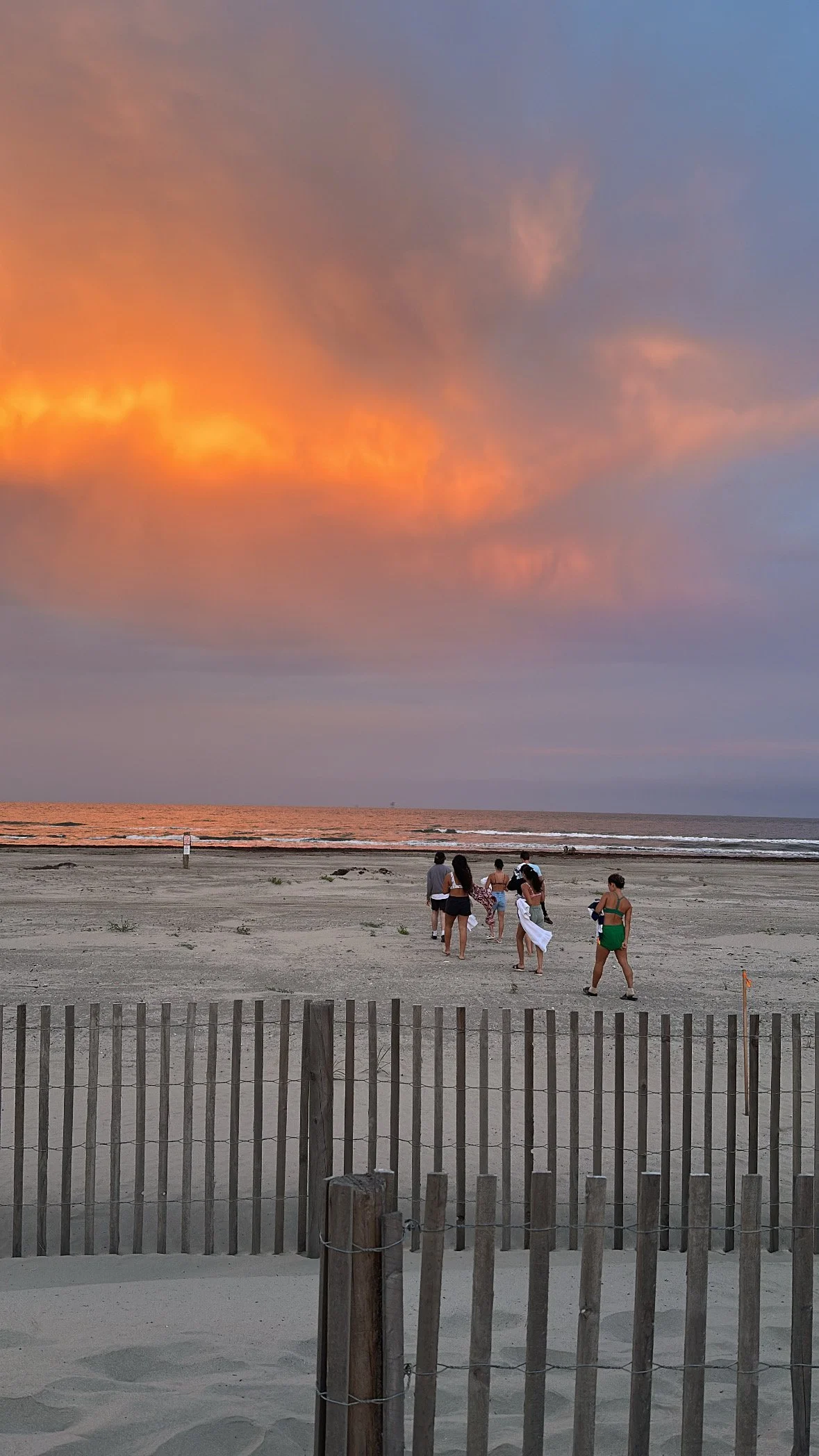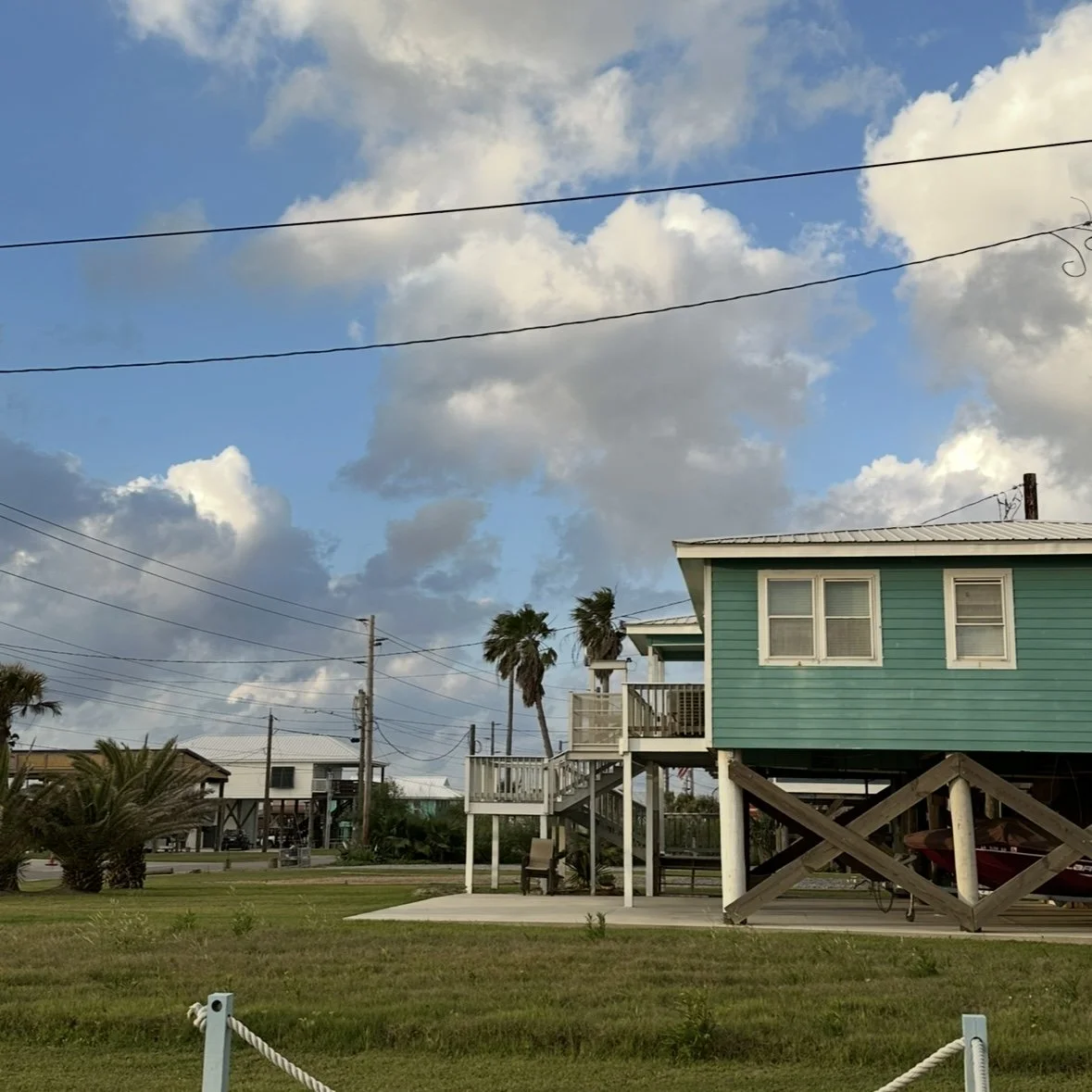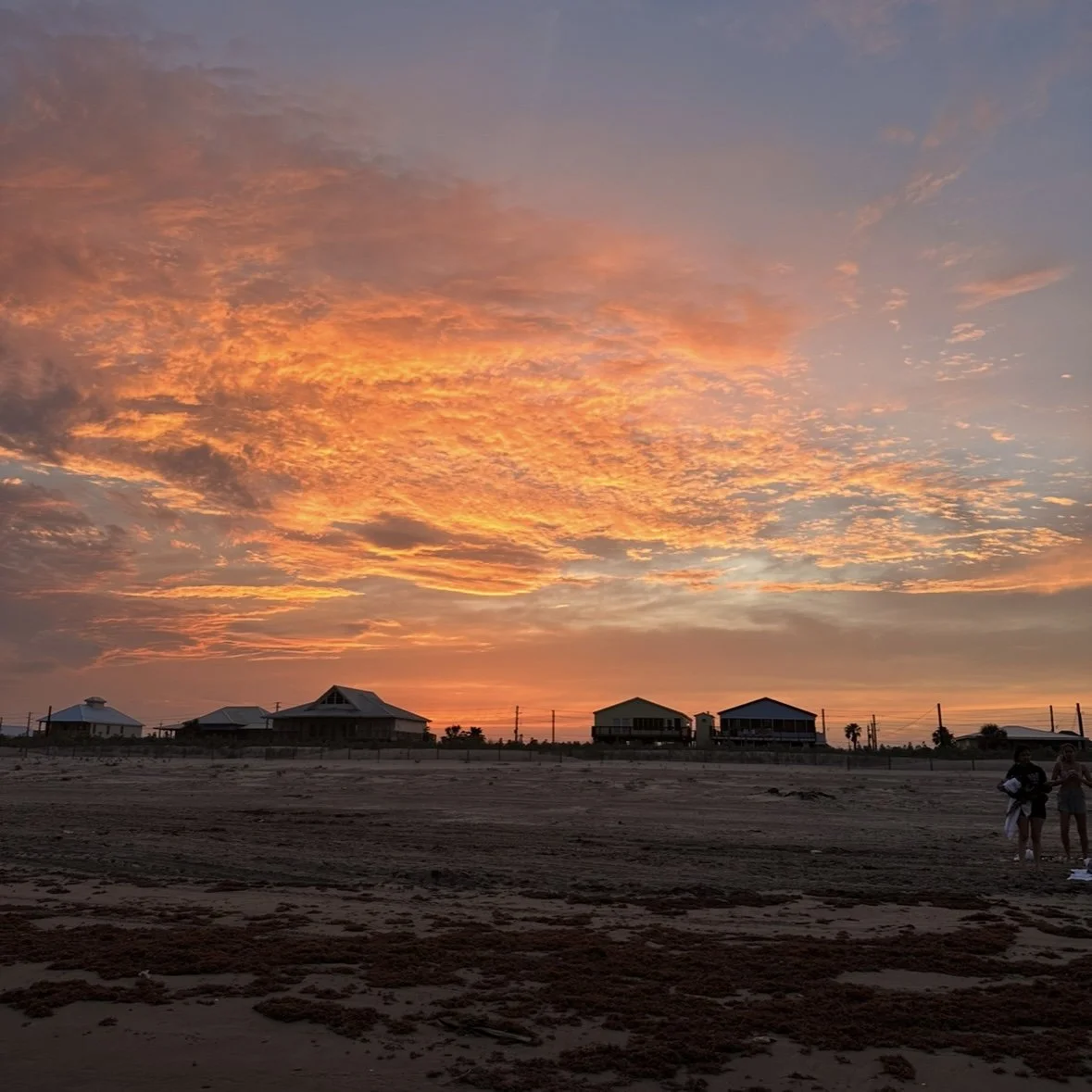“The foamy wavelets curled up to her white feet, and coiled like serpents about her ankles. She walked out. The water was chill, but she walked on. The water was deep, but she lifted her white body and reached out with a long, sweeping stroke. The touch of the sea is sensuous, enfolding the body in its soft, close embrace.”
The lingering embrace of the sun left the beach air buzzing with heat. After a hearty, but over-seasoned, meal of home-made spaghetti bolognese, chicken, and asparagus, we decided to go for a quick swim in the ocean. I watched as my friends, one by one, sprinted into the orange sea, a sparkling mirror image to the static sky painted with unmoving shades of pink and purple. Finally, I made the decision to jump in too!
It was our second full day in Grand Isle, a humble island cradled between the swampy marshlands of Louisiana's southern shore. There was something so foreign yet so familiar about this place; I felt as if we lived inside an Edward Hopper painting. Between bites of gator nuggets and venison tamales, these exotic delicacies which I had to search online to even imagine what they could look like, Grand Isle tugged on the hems of my memory towards the little snippets of Taiwan, my hometown. The palpable heat, the warm ocean, and the sparse blocky houses were all more reminiscent of those hot summer nights on the Baisha Bay than anything I have experienced here in the states, where California’s cold sea water and blue nights instantly banished any remainder of the day, the sun, and the warmth.
There was something procedural in the way that time passed on the island; each day rolled into another predictably like episodes in a TV show, leaving the idle town a crude juxtaposition to the primordial, unchanging shoreline. It seems as though moments can quietly unravel without leaving a mark, and that life can brush past your cheeks so lightly, repeating the same day forever without you ever noticing. I felt like I was stuck in a post-apocalyptic world where the rest of humanity had vanished – taking with them every indicator of change and leaving behind no means of perceiving any real passage of time.
The incessant swaying of waves soon lifted me off of my tip-toes. Swimming, not walking, appeared to be the only way to reach my peers. As I clumsily dog-paddled into the depth, I couldn’t help but think back to our earlier dissection of the Awakening and its disenchanting ending – a tragic scene that takes place right on this very island, in the very ocean that we were swimming in.
In the final scene of the book, Edna, the protagonist, swims out into the horizon and executes one final act of rebellion by committing suicide. As all her terror and exhaustion fades away, Edna swims towards a place with “no beginning and no end”, a place where she can finally be free from the grounding loneliness of everyday life, social responsibilities, and a constant, impenetrable sense of alienation. She leaves behind her family, her lover, and her children. The ocean posed a seductive alternative to everything else – its indomitability, beauty, and unboundedness at once symbols of insurmountable power and of uncurtailed freedom. On such a languid evening like ours, Edna approaches the sea and never returns. This was her choice.
In the distance, flickering waves flattened into an unmoving line. The coral glow of the sun had dulled to a gentle aftertaste now, swallowed by the cavernous night. Street lights blinked like eyes when the waves covered and uncovered them in swift motions.
At that moment, I felt both so powerless yet so free. The water was a giant palm that raised and lowered me with each rounded movement of every tide, the way that a child picks up and puts down her tiny dolls in recreating some epic play-pretend story from the imagination. I tilted my chin up to keep my nose above water, but the waves still hovered closely. That feeling reminded me of trying to fall asleep in a cold, cold room under a thick, heavy blanket. When the blanket was on, you felt the unbearable heat pressing you down into the mattress and drawing out every drop of sweat with its pressing humidity; when the blanket was off, the cool air seeped into your body from the space between your toes and made you shiver helplessly in the glow of the moonlight leaking through the curtains.
At the same time, there was also a sense of comfort underlying the unpredictable oscillating of the waters, like the gentle swing of a hammock on a grassy field. Something pristine glistened under the untameable nature of the ocean – an ancient childlike candidness that only existed in the wilderness, a sincerity that had long been extinguished by the grinding screech of modern city life. The ocean seemed to have a mind of its own – a mind contradictory, indecisive, yet stubbornly swinging like a weighty pendulum. It was at once an object of comfort and an object of terror – like the crawling sense of desperation that “flamed up for an instant” and “sank again” in Edna’s heart. It made you want to stay there forever.
After a while in the waters, my friends and I began to paddle back to shore. Despite the consistent ups and downs of the tide, we safely returned, the sandy ground rising up to meet our feet firmly. The dark blue sky had draped itself over the ocean, and hesitant clouds from the day stayed to indicate their presence, like persistent water stains on a used piece of cloth. The allure of the ocean had now faded into a small whisper of crashing and splashing, as sea foams appeared and disappeared like a flashing grin. As easy as it is to lose yourself in the waves, the shore beams with vitality even on the darkest nights – the plants fluttering with the evening breeze and the yellow flowers illuminated by scattered street lights lining the beach houses. No itching mosquito bite nor the heavy drag of my body through the sand, each grain clinging to my feet with stubborn persistence, can diminish the joy of looking at a sunset, hearing the sound of the waves, or feeling the nice ocean breeze. It was all worth it.
I don’t think Edna made the right choice. I don’t think running away, escape, and abandonment are truly expressions of freedom, courage, and romance. For me, these virtues are much better demonstrated in moving forward despite the swinging tides of life as one pushes towards what they see as beautiful and good. So here’s my choice – to swim back and not just face, but embrace the life that awaits back at the shore.




